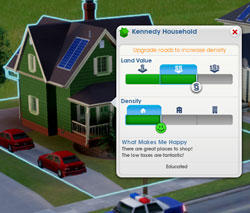
SimCity Strategy Guides
 Upgrading Roads & Zone Density
Upgrading Roads & Zone Density
It is a common tactic to respond to traffic problems by pushing to upgrade all roads to their fullest extent as soon as possible. This article explains why that isn't always a good idea.
The following sections can be found in this article:
 Road Density Explained
Road Density ExplainedThere are two basic types of roads in SimCity; the regular street and the avenue. Both have different density options which include a certain number of lanes for traffic to drive on. Increased density roads not only allow for more vehicles to drive on them at a time, they also correspond to the maximum allowed density of the zoned buildings which are connected to that road.
| Road | No of Lanes |
| Low density dirt track | 1 lane (although visually it appears to be 2) |
| Low density street | 2 lanes |
| Medium density street | 2 lanes for medium density buildings |
| High density street | 4 lanes for high density buildings (what we in the UK would describe as a dual carriageway) |
| Medium density avenue | 4 lanes for medium density buildings |
| High density avenue | 6 lanes for high density buildings |
| High density streetcar avenue | 6 lanes plus a central track for street cars supporting high density buildings. |
Having high density roads does not automatically mean that surrounding buildings will instantly redevelop into towering city skyscrapers. Upgrading roads to high density merely allows for high density buildings to occur when other prerequisites are met. You can just as easily have a network filled with high density roads that only have small low density buildings, however they could develop into higher density, because the road allows for it.
For more information:
 Upgrading Roads Can Lead to Problems
Upgrading Roads Can Lead to Problems
This house is ready to increase density as soon as the road is upgraded
When it comes to traffic problems upgrading roads seems like a positive thing to do; also skyscrapers are great! But upgrading roads can lead to numerous problems within your city if it is not done with care.
Increased density means increased populations of residents, workers and shoppers. Since they will all be using the roads in some fashion this will lead to increased traffic. Higher capacity roads can become jammed easily by Sims trying to turn off onto lower capacity roads when the Mayor hasn't spotted the increased demand on the lower capacity road.
Frequently such demand is periodic; sometimes driven by the day cycle of moving workers and shoppers, sometimes by waves of service and specialization vehicles. In short, upgrading your roads for the sole purpose of breaking up traffic jams can often require a cascade of upgrades across the city and can actually make the traffic problem worse!
Changes in density caused by upgrading roads can also trigger a network-wide increase in journey times. Unless all your zones increase density in a synchronous manner to keep worker / shopper demand in balance, you'll likely find unemployment or worker/shopper shortages which can lead to not only unhappiness and lower approval ratings, but can cause econommic problems and zone degradation.
Changes in building density tend to include changes in the relative proportions of the wealth levels too:
For example: low density high wealth buildings house 3 Sims but high density high wealth buildings are only 2x the ground area, but house 103 Sims! That's a lot of extra high wealth shoppers who will need high wealth jobs and will require better levels of city services! If they have to travel far to find them, that leads to extra traffic and unhappy Sims.
 High density, low tech factories require more than 1600 workers. Can nearby residential zones provide that many workers?
High density, low tech factories require more than 1600 workers. Can nearby residential zones provide that many workers?A sudden increase in your city population caused by density increase will likely mean your current provision of power, water, schooling, healthcare, police, garbage and fire services, will not be enough. You will of course get more tax income to help you upgrade, but running additional services, or placing the upgraded ones, is a very expensive business which could easily tip your carefully balanced budget over the edge!
For more information:
You'll almost certainly need to upgrade your roads as your city develops but it's always a good idea to upgrade patiently and cautiously. Waiting for an area to 'settle' before upgrading other nearby roads. This allows time to make adjustments to zoning, to land value, balancing zone demand and wealth levels by re-zoning etc. If you develop high density residential buildings in an area, but there's no industry, all those Sims are going to be getting into their cars to look for jobs elsewhere. It is much easier to identify the need for expanding local industry and make adjustments before the whole city stops moving!